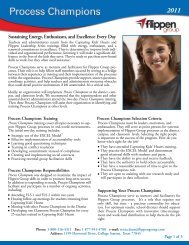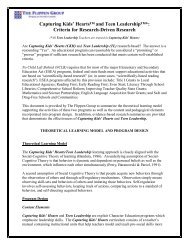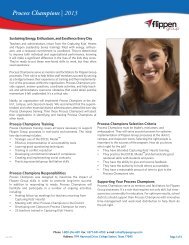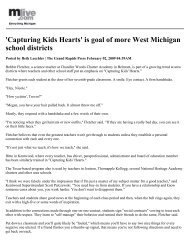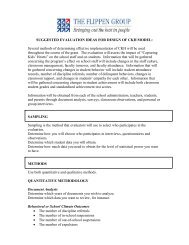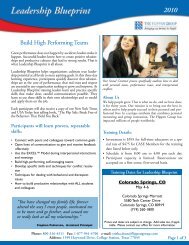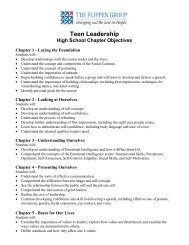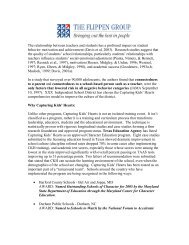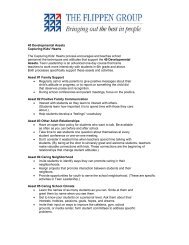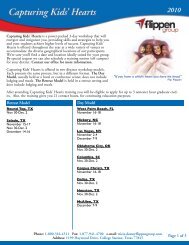Smart & Good High Schools - The Flippen Group
Smart & Good High Schools - The Flippen Group
Smart & Good High Schools - The Flippen Group
- No tags were found...
You also want an ePaper? Increase the reach of your titles
YUMPU automatically turns print PDFs into web optimized ePapers that Google loves.
Research Methodologyand Criteria for Promising PracticesThree Research GoalsThree goals guided our two-year research project. Ourfirst was to identify educational practices that could reasonablybe considered “promising” for developing adolescentcharacter, defined to include both performancecharacter and moral character. This expanded definitionof character led us to look widely for practices supportiveof student learning and achievement, as well as for practicessupportive of student honesty, respect, and otheraspects of moral maturity. Our second goal was todescribe and illustrate these practices in sufficient detailto make them accessible to practitioners. Third, we wantedto generate theory—to develop a working theoreticalmodel of a high school that develops and integrates bothexcellence and ethics.Three Sources of KnowledgeIn our search for promising practices, we have drawn onthree sources of knowledge: (1) theory, (2) research, and(3) on-the-ground wisdom—the voices and experiences ofschool practitioners, parents, and students.A Grounded <strong>The</strong>ory ApproachOur research on promising practices used a “groundedtheory approach.” Grounded theory has been describedas “the discovery of theory from data.” 1 A grounded theoryapproach does not presume a theoretical blank slate.Rather, it typically begins with a partial framework of conceptsor principles. In our case we began with a 16-parttypology of practices (e.g., discipline practices, curricularintegration practices, practices that develop healthylifestyles). During and after our field work, we reviewedour data, looking for emerging themes of interests suchas the contribution of character to the realization ofexcellence. This process resulted in new theoretical categoriessuch as “performance character” and specific outcomessuch as “diligent and capable performer” that weresupported by our observation and interview data. <strong>The</strong>seemerging categories were then elaborated, clarified, andrefined through additional field work. We also comparedand integrated the findings from our field work withknowledge gained from our ongoing review of the relevanttheoretical, empirical, and practical literature.Research MethodologiesOur research over the 18-month period included: (1)assembling a database of relevant literature; (2) site visitsto 24 diverse high schools; (3) guidance from two panels;and (4) supplemental interviews.1. Assembling a database of relevant literature. We gatheredand examined relevant theoretical and empirical literatureon adolescent development, high school reform, andcharacter education, assembling a database of more than1,400 references (books, studies, reports, essays, etc.).2. Site visits to diverse schools. We conducted site visits to 24high schools, large and small, public and private, secularand religious, representing all geographical regions of thecountry. We began by identifying schools receiving externalrecognition (for example, designation as a NationalSchool of Character, U.S. Department of Education BlueRibbon School, Coalition of Essential <strong>Schools</strong> LeaderSchool, National Service Learning Leader School) andthen created a sample of schools stratified by geographiclocation, school size, type, and our desire to observe awide range of practices. Site visits to these schools utilizeda mixed-methods design, including:◆ Focus groups with stakeholders (staff, students, and,when possible, parents)◆ Classroom observations, typically followed by an interviewwith the teacher◆ Interviews with the principal/head of school and otherschool leaders◆ Observing, in action, particular school programs identifiedby a school as its “signature practices”◆ Individual or paired interviews with the two studentsnominated by the school for our National StudentLeaders Panel◆ Analysis of program materials and archival data.3. Guidance from two panels. A National Experts Panel, comprisedof academics and practitioners with expertise inadolescent development, high school education, or charactereducation, gave us both theoretical and methodologicalguidance before and during our study andoffered suggestions on a draft of our report. A parallelNational Student Leaders Panel provided input through onsiteinterviews, a written survey, and feedback on the draftof the report. 2xxii<strong>Smart</strong> & <strong>Good</strong> <strong>High</strong> <strong>Schools</strong>



